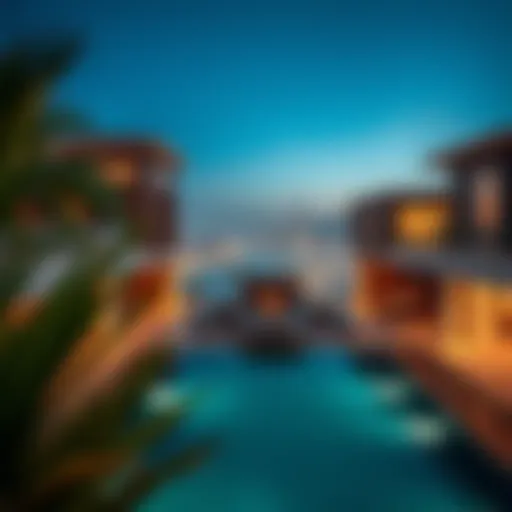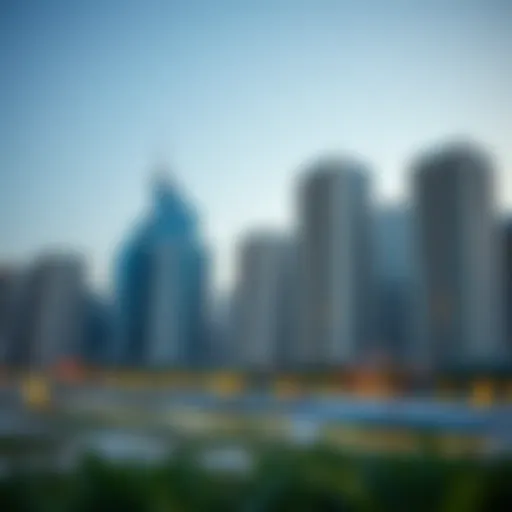Exploring Unique Attractions Across the UAE
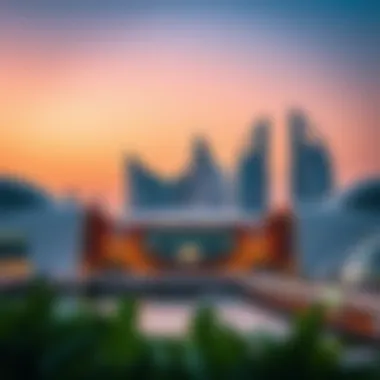
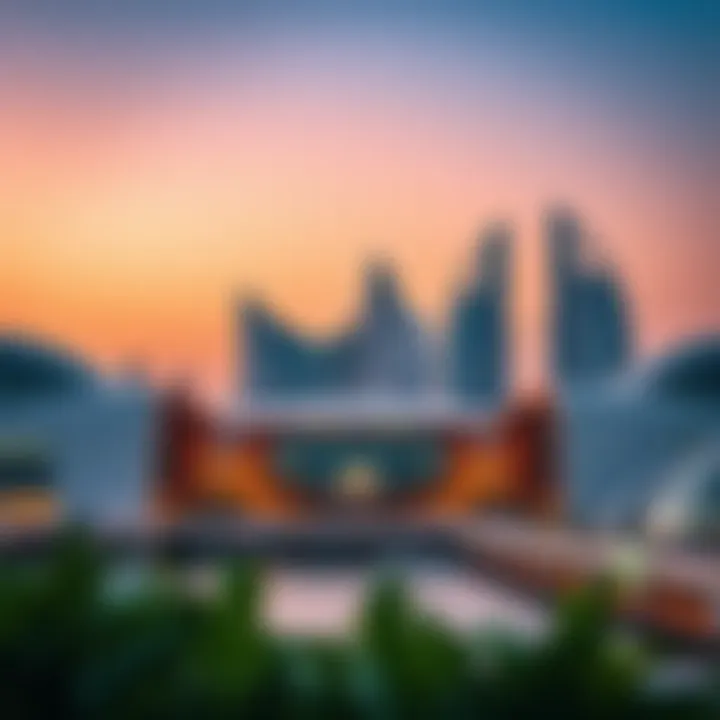
Intro
The United Arab Emirates (UAE) stands as a beacon of modernity amid a rich historical backdrop, blending tradition with cutting-edge innovation. Each emirate tells its own unique story through a tapestry of destinations catering to an eclectic mix of interests, from towering skyscrapers to serene desert landscapes. This article aims to navigate through these exceptional sites, shedding light on what makes each one a must-visit for travelers, real estate investors, and anyone intrigued by the cultural and architectural splendor of the UAE.
As we dive deeper into the myriad offerings of the UAE, we’ll explore prominent landmarks and lesser-known gems alike. You’ll encounter renowned sites like the Burj Khalifa and the Sheikh Zayed Grand Mosque, alongside quaint coastal retreats and cultural enclaves that tell the story of a nation on the rise. Whether you are an investor scouting for real estate opportunities or a lifestyle seeker aiming to immerse yourself in new experiences, this article serves as a detailed guide to the breathtaking variety of the UAE.
The exploration isn’t just about the sites; it’s about understanding their significance and context within the broader scope of the UAE’s development. The balance between opulence and tradition, innovation and history, creates a unique landscape that's worth examining. Let's embark on this journey together, as we uncover the gems that not only reflect the UAE's distinctive character but also provide insight into its future directions.
City Overview of the United Arab Emirates
The United Arab Emirates, a federation of seven emirates, is not just an amalgamation of diverse landscapes and cultures, but also showcases a distinctive urban narrative that speaks volumes about its rapid progress. This article sheds light on the unique urban development and cultural heritage that make the UAE an alluring destination for tourists and investors alike.
Urban Development and Growth
Over the last few decades, the UAE has undergone a transformation that is akin to a caterpillar turning into a butterfly. From humble beginnings to becoming a global hub for trade and tourism, cities like Dubai and Abu Dhabi are perfect examples of remarkable urban growth. Notably, Dubai's skyline has become a symbol of modern architecture, boasting structures such as the Burj Khalifa, which pierces the clouds at an astounding height. This ambitious rise is not just about aesthetics; it reflects a robust economy backed by strategic investments in trade, tourism, and technology.
Plenty of factors have contributed to this urban boom. A central location on the map bridging Europe, Asia, and Africa has made the UAE an ideal stopover for international flights, boosting transport and trade immensely. Additionally, visionary governance plays a crucial role here. Policies tailored towards diversification away from oil dependency have spurred various sectors, including real estate and hospitality. In fact, the Dubai Expo 2020 (held in 2021) highlighted the city’s commitment to innovation and culture, drawing millions from across the globe to explore its offerings.
The growth isn’t without its challenges. Urban planning must navigate environmental concerns, traffic congestion, and housing demands. As the population expands, ensuring sustainability becomes imperative. However, the UAE is taking steps to integrate green technologies, showcasing their commitment to creating a future that balances progress with preservation.
Cultural Heritage
While the UAE gallops towards modernity, it remains deeply rooted in its cultural heritage. Traditions, customs, and history are interwoven into the fabric of everyday life. Cities like Sharjah stand as testaments to the rich Arabian culture, with museums that celebrate Islamic art and architecture.
Local festivals, such as Eid celebrations and traditional dance performances, provide glimpses into the Emirati way of life. The importance of falconry and camel racing, for instance, goes beyond mere sports — they evoke a sense of pride and continuity of the cultural identity.
Additionally, the UAE is dedicated to preserving its heritage. Initiatives aimed at teaching the youth about their history are crucial in ensuring that traditional values are maintained amid modernization. The architectural design of many new buildings incorporates elements inspired by Islamic art, reflecting a harmony between the past and present.
"The UAE stands as a brilliant example of how modernity and tradition can coexist, making it a rich tapestry of experiences for travelers and investors alike."
For more insights into the UAE’s urban development and cultural heritage, you can visit resources like Britannica, and explore the latest updates on Wikipedia.
As the UAE continues to grow and evolve, its cities promise unparalleled opportunities for those willing to explore its exceptional destinations.
Dubai: The Jewel of the UAE
Dubai stands tall as a beacon of modernity and luxury in the United Arab Emirates. This bustling metropolis is not just the nation’s most famous city; it embodies the essence of ambition and innovation within the UAE. For property enthusiasts, investors, and lifestyle seekers, understanding the dynamics of Dubai is paramount. Its blend of culture and cutting-edge facilities makes it an attractive destination not just for travelers but also for those looking to invest, reside, or explore the potential of a vibrant economy.
The significance of Dubai can be attributed to various elements, including its architectural feats, cultural offerings, and economic prowess. A noticeable aspect of the region is its rapid evolution — transforming from a modest fishing village into a global city within a mere few decades. This transformation underscores the strategic foresight of its leaders and its strong economy driven by tourism, trade, and technology.
Notably, Dubai's landmarks exhibit the juxtaposition of tradition and modernity, inviting visitors to explore its depths. Each site contributes to a narrative that combines luxury with a unique cultural heritage. The following sections will delve deeper into the key aspects of Dubai, showcasing its charm and significance for different audiences.
Burj Khalifa and its Significance
Standing at an astonishing 828 meters, Burj Khalifa is not just the tallest building in the world; it symbolizes Dubai’s aspirations. Completed in 2010, this architectural wonder offers both residents and tourists an unmatched view of the city and beyond. The drive behind this landmark was laid on three key foundations: pushing the limits of engineering, creating a beacon of tourism, and igniting economic growth through real estate development.
Visitors ascend to the observation decks on the 124th and 148th floors, providing panoramic views that are simply breathtaking. Additionally, the Burj Khalifa plays a significant role in the tourism sector, attracting millions each year, feeding into the local economy and fostering a global image that is synonymous with luxury living. Its external design reflects Islamic architecture, intertwining modern technology with cultural traits that are dear to Emirati heritage.
Dubai Marina: A Modern Waterfront
Dubai Marina is another striking example of Dubai’s architectural and urban planning genius. Spanning over three kilometers along the Persian Gulf shoreline, it boasts a dynamic waterfront filled with skyscrapers, restaurants, and entertainment options. The development highlights the UAE's commitment to innovative urban design and modern living.
A stroll along the marina, commonly filled with joggers, families, and couples, paints a picture of a thriving community. The area is not only an invite to lush leisure but a statement on living large, with luxury yachts bobbing in the water and upscale eateries lining the promenades. As a hub for expats and locals alike, it's a microcosm that reflects Dubai’s status as an international city.
The Dubai Marina Mall, shops, and open-air markets further enhance the vibrancy of this waterfront area, making it a must-visit for anyone exploring the city. This modern luxe lifestyle fosters a sense of community while drawing in high-end retailers keen to tap into Dubai’s affluence and diverse population.
The Dubai Mall Experience
When it comes to shopping in Dubai, The Dubai Mall is truly the pièce de résistance. Known as the largest shopping mall in the world, it hosts over 1,200 shops, countless dining options, and attractions that captivate all ages. The sheer scale of the mall is indicative of Dubai's economic importance in retail markets.
A key highlight of the mall is the Dubai Aquarium, providing an immersive experience that showcases the beautiful marine life of the region. For those seeking entertainment, the Dubai Ice Rink is a delightful diversion, alongside the theatrical experiences available in its many cinemas. Whether perusing luxury brand boutiques or enjoying family activities, the Dubai Mall amplifies the notion that this city is where shopping transforms into a comprehensive experience of leisure and entertainment.
Moreover, the mall’s strategic location in downtown Dubai allows it to maintain a constant flow of visitors from not only local residents but intricate tourist networks. In essence, The Dubai Mall is more than just retail; it represents an ethos of lifestyle, echoing the city's ability to blend leisure with luxury in an organized yet spirited manner.
"Dubai is where luxurious dreams meet modern reality, encapsulated in its magnificent landmarks like Burj Khalifa and Dubai Marina."
By exploring Dubai, individuals can recognize not just a city dripping in wealth but rather a dynamic environment that nurtures growth, innovation, and cultural convergence.
Abu Dhabi: The Cultural Capital
Abu Dhabi stands as the beating heart of the United Arab Emirates, embodying a blend of rich tradition and rapid modernization. As the capital city, it serves as the political and administrative center of the nation. More importantly, it holds an impressive narrative filled with cultural significance. This feature makes Abu Dhabi an exemplary focal point for attracting investors, homebuyers, and architects, not just for its development potential but for its commitment to culture and heritage.
When we think of Abu Dhabi, several elements come to mind that enhance its stature in the UAE.
- Cultural Institutions: A thriving hub for art and architecture, Abu Dhabi attracts visitors and residents who appreciate both the historical value and modern interpretations of culture.
- Festivals and Events: Regular cultural festivals celebrate everything from traditional Emirati folklore to contemporary art, fostering a vibrant arts scene that resonates with expats and locals alike.
- Tourism Growth: With its robust tourism infrastructure, the city becomes a magnet for visitors from around the world, contributing to a dynamic economy.
This section shines a light on specific landmarks that capture the essence of Abu Dhabi's cultural appeal.
Sheikh Zayed Grand Mosque
The Sheikh Zayed Grand Mosque is not only the largest mosque in the UAE but also a monumental piece of architecture that reflects the harmonious blend of cultures. This mosque welcomes visitors of all backgrounds, showcasing how inclusive Abu Dhabi is in its cultural philosophy. With 82 domes and over 1,000 columns, it's an architectural wonder that invites awe.
While exploring the mosque, one can appreciate intricate mosaics and stunning calligraphy, which speak volumes about Islamic artistry. The mosque is open to the public, which provides a unique opportunity for those outside the Islamic faith to experience the spiritual atmosphere firsthand. Exhibitions and educational tours further enrich this experience, making it more than just a visual feast.
Key Features of Sheikh Zayed Grand Mosque
- Capacity: Able to accommodate more than 40,000 worshippers.
- Materials Used: Constructed using materials sourced from multiple countries, enhancing its international appeal.
- Night Illumination: The mosque is particularly enchanting at night, when it is beautifully illuminated, offering a serene escape from the busy city life.
Louvre Abu Dhabi: Art and Architecture
Louvre Abu Dhabi is more than just an art museum; it represents a bridge connecting various cultures and civilizations through art. Designed by the famed architect Jean Nouvel, its architecture incorporates a stunning interplay of light and shadow, inspired by traditional Arab motifs. The museum functions as a global platform for cultural exchange, housing masterpieces from varied eras.
Visiting Louvre Abu Dhabi offers multiple layers of experience: exhibitions on ancient artifacts, contemporary art, and everything in between. It's inspiring to see how the museum blends different cultures, and its innovative structure reflects this ethos beautifully. The museum's presence elevates Abu Dhabi's status as a prominent cultural destination on the global map.
Highlights of Louvre Abu Dhabi
- Diverse Collection: Features artworks from all around the world, emphasizing universal themes that connect humanity.
- Family Friendly: Interactive exhibitions make it an inclusive space for all ages, encouraging a deeper understanding of art.
- Cultural Programs: Hosts workshops and discussions to engage the community, fostering a love for art and culture.
Corniche: Waterfront Leisure
The Corniche is more than a picturesque waterfront. It's a symbol of leisure, community, and a greener urban environment. Stretching for several kilometers, the Corniche offers bike paths, beaches, and parks, making it a favorite spot among families, tourists, and residents.
Spending time at the Corniche means immersing oneself in the local lifestyle, from sipping coffee at a café overlooking the water to joining a yoga class at sunrise. It encapsulates the essence of how urban spaces can enhance quality of life, blending relaxation with the vibrancy of a busy city.
Features of Corniche


- Accessibility: The promenade is easily accessible, with dedicated lanes for pedestrians and cyclists.
- Community Events: Regular events such as marathons, cultural festivals, and outdoor movie nights attract crowds.
- Scenic Views: Breathtaking views of the city skyline and the Arabian Gulf make it a popular spot for Instagram photography.
Abu Dhabi as a cultural capital continues to evolve, adding layers to its identity. From iconic structures to leisure spaces fostering community interaction, each element contributes to a comprehensive experience that defines life in the UAE's capital.
Sharjah: The Cultural Heart
Sharjah stands as a beacon of cultural preservation and innovation within the United Arab Emirates. Recognized as the cultural capital of the UAE by UNESCO in 1998, it serves as a significant attraction for those desiring to immerse themselves in the region's rich heritage and artistic expressions. Unlike its more commercial counterparts, Sharjah has carved a niche for itself as a hub of arts, history, and education. This character makes it an essential stop for investors, homebuyers, realtors, expats, and architects who wish to explore a facet of the UAE that transcends its glimmering skyscrapers and shopping malls.
The importance of this emirate lies in how it couples modernity with tradition. Visitors can find vibrant art displays alongside historical museums, creating an enriching experience. People often say that a journey through Sharjah feels like walking through a history book, one that showcases the talents and stories of generations.
Sharjah Art Foundation
The Sharjah Art Foundation is at the forefront of the emirate's commitment to contemporary art and cultural dialogues. This institution plays a crucial role in fostering artistic talent and providing a platform for both local and international artists. Its diverse programming includes exhibitions, workshops, and community-centered art initiatives that encourage public engagement.
A visit to the foundation reveals a transformed landscape of old and new. Exhibitions are often housed in historical buildings, including the iconic Bait Al Serkal, which seamlessly blends tradition with innovation. Here, art becomes a bridge connecting past experiences with contemporary thought.
- Significance of the Foundation:
- Supports artists through grants and residencies
- Hosts the Sharjah Biennial, a key event in the global art calendar
- Promotes cultural exchange by featuring international artists
The foundation’s pursuit of enriching local culture through art is palpable. Its impact on the community goes beyond visual aesthetics; it fosters dialogues that reflect societal values and challenges. For those in the arts or looking to invest in cultural projects, proximity to the Sharjah Art Foundation could mean valuable connections and insights into the growing art market of the emirate.
Sharjah Museum of Islamic Civilization
Situated in the heart of Sharjah, the Sharjah Museum of Islamic Civilization presents a captivating overview of Islamic culture's profound contributions to civilization. This place serves not just as a museum but as a crossroads of knowledge where visitors can explore a multitude of themes, from science and technology to the arts and heritage.
As you step inside, there is an inviting atmosphere that beckons you to explore artifacts and exhibitions that tell tales of a grand legacy. Items on display, such as the exquisite Islamic manuscripts or intricate calligraphy, showcase the advancements made during various historical periods. Education is at the core of this museum's mission, making it especially appealing to families, educators, and students eager to understand the contributions of Islamic civilization.
- Key Features of the Museum:
- Interactive exhibits that engage visitors of all ages
- Permanent collections showcasing rare artifacts
- Regular workshops and talks enhancing cultural understanding
The museum operates not merely as a collection of historical items but as an educational institution fostering greater awareness and appreciation of Islamic cultural heritage. With Sharjah emphasizing the importance of education and cultural preservation, it lays the groundwork for a more connected community, making it a prime focus for anyone interested in architectural and cultural development in the UAE.
As Sharjah continues to evolve, its commitment to fostering cultural identity ensures its position as a vital cultural heart in the UAE. Exploring its art and heritage not only enriches the experience of visitors but also highlights opportunities for investment in cultural endeavors, real estate, and community engagement.
Ajman: The Hidden Gem
Ajman, often overshadowed by its glitzier neighbors, offers a refreshing escape from the bustle of the UAE's metropolitan areas. As the smallest emirate, it is often regarded as a hidden gem waiting to be uncovered. The serene landscapes combined with rich cultural experiences make it attractive for those looking to invest in unique destinations or simply explore off-the-beaten-path locales. Whether one is considering residential options, remote work, or simply a vacation, Ajman presents opportunities and experiences not easily found elsewhere.
The emirate not only boasts stunning natural beauty but also delivers a sense of tranquility that is often lost in larger cities. It serves as a canvas where one can paint their picture of an idyllic lifestyle, whether it’s soaking up the sun on pristine beaches or delving into the history that permeates its attractions.
Ajman Beach: Serenity and Relaxation
Ajman Beach is a prominent highlight within the emirate, alluring locals and tourists alike with its golden sands and clear waters. Stretching over 16 kilometers, the beach is not just a spot for sunbathing, but a hub of relaxation and leisure activities. Visitors can engage in various water sports like jet-skiing or paddleboarding, allowing them to enjoy the refreshing waters of the Arabian Gulf.
- Why Visit?
- Peaceful Atmosphere: Unlike some of the busier beaches in Dubai, Ajman Beach offers a calm environment, making it perfect for families or anyone looking to unwind.
- Clean and Well-Maintained: The beach is meticulously kept, with facilities that ensure a comfortable visit, enhancing the overall experience.
- Diverse Dining Options: There are several beachfront cafes and restaurants that serve delicious local and international cuisine, allowing guests to savor fresh seafood while enjoying stunning sunset views.
In the midst of your relaxation, Ajman Beach serves as a reminder of the majestic beauty of the UAE’s natural coastline, providing an alternative that many expats and visitors tend to overlook.
Ajman Museum: A Glimpse into History
For those keen on history, the Ajman Museum offers a deep dive into the emirate’s cultural heritage. Housed in an impressive 18th-century fortress, the museum tells the story of Ajman from its humble beginnings to its present day prosperity. Here, visitors can explore life in the region through a range of artifacts, including traditional household items, manuscripts, and tools from ancient trades.
- Must-See Features:
- Archaeological Artifacts: Ancient tools and pottery provide insights into the life of early inhabitants, showing how they thrived in the harsh desert environment.
- Cultural Exhibitions: Rotating exhibits showcase the rich traditions of the emirate, including Bedouin crafts and regional customs.
- Historical Displays: Learn about Ajman’s evolution, including its significance in maritime trade and how its strategic location benefited the local economy.
The museum serves not just as an educational hub but is a cornerstone for those who wish to understand the vibrant history of Ajman. It stands as a testament to the emirate’s journey and its place within the broader national narrative.
"Ajman is a paradox where tradition meets tranquility, presenting an extraordinary story worth exploring, one serene beach day or historical exhibit at a time."
Ajman encapsulates the essence of the UAE's rich culture and natural beauty, making it a destination not to be missed. Investors, homebuyers, and leisure seekers alike will find that this emirate packs a punch, offering not only scenic beauty but a taste of history and cultural depth.
Ras Al Khaimah: Nature Meets Adventure
Ras Al Khaimah is often overshadowed by its flashier neighbors, like Dubai and Abu Dhabi, yet it offers a unique blend of nature and adventure that truly sets it apart. Nestled among the Hajar Mountains and the Arabian Gulf, this emirate is a treasure trove for those looking to experience the raw beauty of the UAE. For investors and lifestyle seekers, its expanding tourism sector means potential opportunities that align with nature-centric ventures. Here, outdoor activities flourish, making it an ideal locale to delve into scenic adventures and explorations.
Jebel Jais: The Emirate’s Highest Peak
Standing tall at an impressive 1,934 meters, Jebel Jais is not just the highest peak in Ras Al Khaimah but the highest in the whole of the UAE. The mountain is often blanketed in clouds, making it a spectacular sight against the backdrop of the sky. The road leading up to Jebel Jais is dubbed the "Road of the Kings", and rightly so. Drivers and riders can experience a breathtaking ascent with numerous lookout points offering stunning vistas of the surrounding landscape.
For adventure enthusiasts, Jebel Jais offers an invigorating menu of activities, making it a hotspot for thrill-seekers. One of its most notable attractions is the Jebel Jais Flight, which holds the title for the world’s longest zipline. Zip-lining from the summit to the base gives participants an adrenaline rush paired with panoramic views of the rugged terrain below. It’s an exhilarating experience that reflects the adventurous spirit that Ras Al Khaimah seeks to foster.
"The thrill of flying over valleys, enveloped in cool mountain air, is an experience that redefines excitement."
The peak also hosts various trekking trails for hikers of all skill levels, further encouraging visitors to indulge in the emirate's extraordinary outdoor offerings. Whether you're a seasoned climber or just looking to take a leisurely hike, the trails are filled with breathtaking scenery that illustrates the diverse ecosystem of the region.
Al Hamra Village: A Coastal Retreat
A stone’s throw away from the bustling city life is Al Hamra Village, emblematic of the harmonious blend between coastal charm and luxurious living. This coastal retreat shines as a premier destination for families and vacationers alike. The architecture here is a blend of traditional and contemporary designs, which speaks volumes about the emirate's efforts to preserve its cultural heritage while catering to modern tastes.
Al Hamra boasts pristine beaches along the azure waters of the Gulf, making it a perfect spot for relaxation. The beach activities available are plentiful, from sunbathing and swimming to kite-surfing in the gentle waves. For those looking to wind down, numerous beachside cafes offer delicious bites and refreshing drinks, with ocean views that are nothing short of mesmerizing.
Additionally, the Al Hamra Golf Club provides a stunning 18-hole championship course, where players can take in the views of lush greenery juxtaposed against the desert landscape. For investors looking to tap into a burgeoning community, the residential developments in Al Hamra Village also present appealing opportunities as families seek out properties that offer both comfort and access to leisure activities.
Fujairah: A Coastal Paradise
Fujairah stands out as a remarkable destination within the United Arab Emirates, uniquely located on the eastern coast along the Gulf of Oman. It differs from its counterparts, known for their futuristic architecture and urban development, by offering a tranquil seaside experience blended with rich history and natural beauty. The potential for exploration and investment here is substantial, as the region comprises stunning beaches, freshwater springs, and historical sites. For those looking to diversify their travel itinerary or seek investment opportunities, Fujairah can provide both leisure and cultural enrichment.
Fujairah Fort: A Historical Landmark
Fujairah Fort is not merely a structure; it is the embodiment of the emirate's historical significance. Dating back to the 16th century, this fortification narrates tales of resilience and defense against invasions. Nestled atop a hill, it offers visitors panoramic views that are simply breathtaking. Walking through its ancient walls, one can almost feel the whispers of history echoing around.
- The fort’s tower, constructed using local stones, has seen numerous renovations, ensuring its preservation.
- Visitors can explore its various sections, including living quarters and storage spaces.
"Fujairah Fort is a testament to the Emirati spirit, showcasing both strength and ingenuity in its design."
For investors and homebuyers, the fort’s proximity to emerging real estate developments signifies a blend of cultural and commercial value in the region. Future projects around this historical site enhance its desirability for both tourists and residents alike.
Snorkeling at Snoopy Island
Diving into the crystal-clear waters around Snoopy Island reveals an underwater paradise filled with vibrant marine life. This destination is a hotspot for snorkeling enthusiasts, offering a chance to experience the breathtaking corals and tropical fish that flourish in this marine ecosystem. The ease of access from the coastline makes it an ideal spot for both experienced snorkelers and novices.
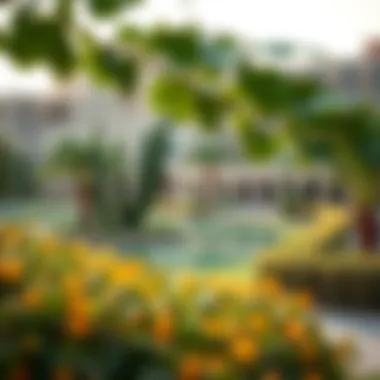
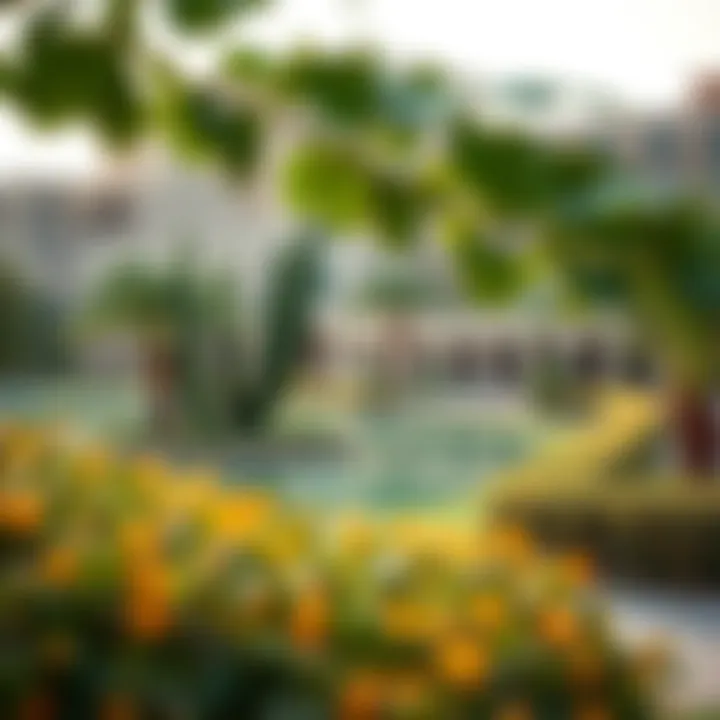
- Equipment rental services are available nearby, making it convenient for anyone keen to explore.
- Guided snorkeling tours are also popular, providing a safe and informative experience.
Firstly, Snoopy Island is remarkable not just for its aquatic life but also for its scenic beauty, appealing to those interested in photography and adventure tourism. The combination of sun, sand, and sea makes it a compelling spot for family outings, which elevates its status as a desirable location for real estate and leisure investments.
Experiencing Fujairah allows one to appreciate the diverse offerings of the UAE, far removed from the high-rise glamour, yet rich with natural beauty and deep-rooted culture. A visit to Fujairah is not just a getaway; it’s an immersion into a unique facet of Emirati heritage that captivates and inspires.
Umm Al-Quwain: Historical Exploration
Umm Al-Quwain, often overshadowed by its more glitzy neighbors, offers a unique glimpse into the UAE’s rich history and heritage. This emirate, the least populated in the country, provides a serene escape and a chance to explore remnants of the past, making it an enthralling destination for history enthusiasts and discerning travelers alike. The significance of Umm Al-Quwain in the grand narrative of the UAE cannot be understated, as it is here that you will find a blend of tradition and cultural depth, perfect for investors and individuals keen on understanding the region's evolution.
In recent years, Umm Al-Quwain has emerged as a destination for those seeking quiet, historical exploration, without the bustling crowds found in other urban locales. The emirate's commitment to preserving its history while embracing modernity creates an intriguing juxtaposition. Travelers and homebuyers venturing into this area can look forward to both tranquil landscapes and captivating stories waiting to unfold.
Dreamland Aqua Park: Fun for Families
Dreamland Aqua Park isn’t just another water park; it’s a family-friendly haven that seamlessly mixes excitement with relaxation. Spanning over 250,000 square feet, the park is loaded with diverse attractions that cater to all ages. From the adrenaline-pumping rides to the leisurely lazy river, there’s something for everyone.
One of the park's standout features is its commitment to safety and family enjoyment. It’s a well-thought-out environment where families can create lasting memories while enjoying a day in the sun. Visitors have noted that it's not just about the rides, but also about the comprehensive amenities—think pleasant dining options, spacious lounging areas, and well-maintained facilities.
As you navigate through, consider:
- Thrilling Waterslides: Experience rides like the Wave Pool and the Master Blaster.
- Family-Friendly Zones: Areas designed specifically for younger kids to enjoy.
- Dining Choices: A variety of food options to refuel after a day of fun.
This park serves as a lively focal point in Umm Al-Quwain, encouraging community engagement and promoting healthy family interactions.
The Old Town of Umm Al-Quwain
Walking through the Old Town of Umm Al-Quwain feels much like stepping back in time. Its palm-fringed streets and traditional architecture capture the essence of what life may have looked like decades ago in the region. The town, often less frequented by tourists, retains an authenticity that can be hard to find in other parts of the UAE.
One notable site is the Umm Al-Quwain Fort, which dates back over two centuries and stands as a testament to the emirate’s strategic importance in history. It is not merely a building; but a narrative carved into its walls. Here, explorers can learn about the Bedouin lifestyle and the heritage of the emirate, often still echoed in the stories of the locals.
Some points of interest in the Old Town include:
- Cultural Sites: Explore remnants of ancient structures that showcase traditional life.
- Heritage Museum: Dive deeper into the local history and culture.
- Local Market: Engage with artisans and discover handcrafted goods.
"History is not a burden on the memory but an illumination of the soul."
For more information about Umm Al-Quwain, you can explore resources such as Wikipedia, and delve deeper into local attractions at Visit Ajman.
Visitors to the region will also find ample opportunity to engage with locals, enhancing their understanding of the UAE's journey through time.
Experiential Travel: Unique Offerings
Experiential travel has become an integral part of tourism, particularly in dynamic regions like the United Arab Emirates (UAE). As travelers seek not just to visit, but to engage fully with their surroundings, the UAE offers an array of experiences that are as diverse as its landscapes. This section sheds light on two standout offerings: desert safaris and dhow cruises. These activities not only hone in on the culture and natural beauty of the UAE but also cater to different preferences—from thrill-seekers to those leaning towards serene traditions.
The significance of experiential travel stems from its emphasis on interaction with destinations. Unlike traditional tourism, it encourages making connections, whether with local cultures, natural wonders, or historical narratives. Travelers can immerse themselves in rich traditions, taste local flavors, or delve into outdoor adventures. For investors, homebuyers, and real estate agents, understanding this shift in tourism dynamics is crucial, as it signals opportunities for development, investment, and tailored offerings in the market.
Additionally, experiential travel supports local economies by promoting small businesses and artisans. By engaging with the community, tourists contribute to economic sustainability, ultimately enhancing their overall travel experience.
Desert Safaris: Adventure Awaits
Desert safaris in the UAE are more than just a pastime; they are a rite of passage for many who venture into the arid beauty of the desert. The thrill of riding over rolling dunes in a 4x4 vehicle offers an adrenaline rush, while at the same time revealing the stark, yet breathtaking, landscape of the desert. Visitors can expect guided tours that not only provide a heart-pounding experience but also educate about the ecosystem.
Furthermore, a desert safari typically includes unique experiences such as:
- Camel rides: A traditional way to traverse the sandy terrain.
- Sandboarding: Glide down the dunes, giving a rush that’s hard to beat.
- Cultural experiences: Engage with local customs through Bedouin-style camps, complete with traditional meals, henna painting, and even falconry displays.
These safaris provide insights into the delicate balance between human activity and nature. Travelers have the chance to witness spectacular sunsets, illuminate the beauty of the barren land, and perhaps even stargaze under a clear sky far removed from urban noise. The opportunity to experience the traditional side of the UAE makes desert safaris a pinnacle of experiential travel.
Dhow Cruises: Embracing Tradition
In stark contrast to the desert landscapes, dhow cruises offer a glimpse into the rich maritime history of the UAE. Dhows, elegant wooden boats, have been central to the culture and economy of the region for centuries. A cruise on one of these vessels provides not only scenic views but also an experience steeped in tradition.
Tourists can choose between daytime sails or evening excursions, often accompanied by a buffet dinner featuring local and international dishes. While cruising along the serene waters of Dubai Creek or the coast of Abu Dhabi, passengers can enjoy:
- Captivating views: Skyscrapers reflect off calm waters, offering picturesque scenes.
- Cultural performances: Live music and dance can create a joyful atmosphere, immersing guests in Emirati culture.
- Photo opportunities: The sight of traditional dhows against a backdrop of modern architecture presents a striking contrast that photographers cherish.
Dhow cruises highlight the synergy between past and present in the UAE. Engaging with local fishermen, exploring artisanal craftsmanship, and tasting fresh seafood can enhance the experience. Visitors not only enjoy a tranquil escape but also tap into a narrative that connects the UAE's history to its present-day allure.
"Experiential travel is more than just seeing sights; it's about understanding the heart and soul of a destination."
In summation, the duality of experiences found in desert safaris and dhow cruises encapsulates the essence of experiential travel within the UAE. For those looking to invest in this vibrant region, recognizing these unique offerings can be pivotal in tailoring products and experiences that meet the ever-evolving desires of the modern traveler. By fostering connections with culture and nature, the UAE stands out as a destination that truly embraces the spirit of exploration.
Culinary Experiences: A Taste of the UAE
The culinary landscape of the United Arab Emirates is as diverse and vibrant as its population. Food is not just sustenance; it’s a narrative that tells tales of heritage, cultural exchange, and innovation. This section ventures into the unique culinary experiences available throughout the UAE, underscoring their significance in an ever-evolving region marked by tradition and modernity.
Culinary adventures here are rich with flavors and experiences that transcend the plate. They offer investors, homebuyers, realtors, expats, and architects an opportunity not only to savor but also to understand the heartbeat of Emirati culture and lifestyle. Local gastronomy serves up a blend of Middle Eastern spices, grilled meats, and fresh seafood, inviting everyone to partake in a feast that feels like coming home.
Dining in Dubai: A Culinary Adventure
Dubai is often referred to as the melting pot of the world, and this title rings true in its food scene. From street food stalls to lavish five-star eateries, culinary delights are around every corner. Each district screams a different flavor, reflecting the city’s multicultural environment.
- Emirati Traditional Restaurants: Experience authentic dishes like Al Harees and Shawarma at establishments like Al Fanar. Here, meals come laden with history and served with a side of hospitality.
- Global Flavors: Restaurants such as Zuma and Nobu highlight Dubai’s penchant for luxury, offering fusion dining experiences that attract both locals and tourists alike.
The Dubai Food Festival further amplifies these experiences, turning the city into a culinary playground for gourmets and casual diners alike.
Taste of Tradition: Emirati Cuisine
While the UAE embraces international cuisines, its own culinary traditions hold a special place. Emirati cuisine is a treasure chest filled with time-honored recipes handed down through generations. Dishes are often prepared for significant celebrations, showcasing the warmth and generosity of the culture.
- Key Dishes to Try:
- Majboos: A spiced rice dish often accompanied by slow-cooked lamb or chicken.
- Margoog: A savory stew where meat is cooked in a flavorful broth, usually served with thick, flatbread.
- Luqaimat: Sweet dumplings served with date syrup, they provide the perfect ending to any meal.
"Food is the ultimate connector — it bridges cultures and fosters understanding."
Whether you're visiting Dubai’s bustling souks or the serene waterfront, food is an essential part of experiencing the UAE's soul. Restaurants and cafes become hubs of social interaction, where stories blend with aromatic spices and sizzling dishes.
In summary, the culinary experiences within the UAE offer more than just meals; they present a deep connection to the land and its people. The interplay between tradition and modernity in dining serves as a powerful reminder of the rich tapestry that defines this dynamic region. Through food, both residents and visitors forge connections that often last far beyond a shared meal.
Shopping Destinations: Retail Therapy
The shopping scene in the United Arab Emirates is nothing short of a vibrant tapestry, blending tradition with modernity. It's not just about buying products; it’s about the experiences that come along with this retail therapy. When one thinks of the UAE, Dubai's towering malls and traditional souks come to mind. These destinations aren't merely locations for transactions. They are cultural hubs, weaving together stories, traditions, and contemporary lifestyles. For investors, homebuyers, and expatriates, understanding these shopping venues can enhance their experience and investment decisions in the country.
Souks: A Traditional Market Experience
Walking through the narrow alleys of the souks in the UAE is like stepping into a living museum. The sights, sounds, and smells create an intoxicating atmosphere that immerses visitors in the heritage of this vibrant region.
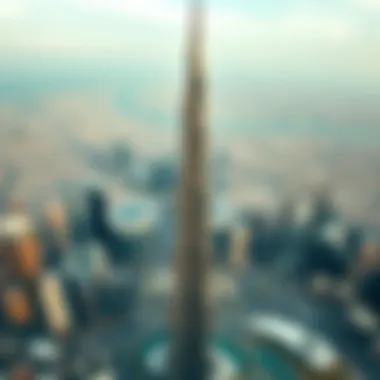
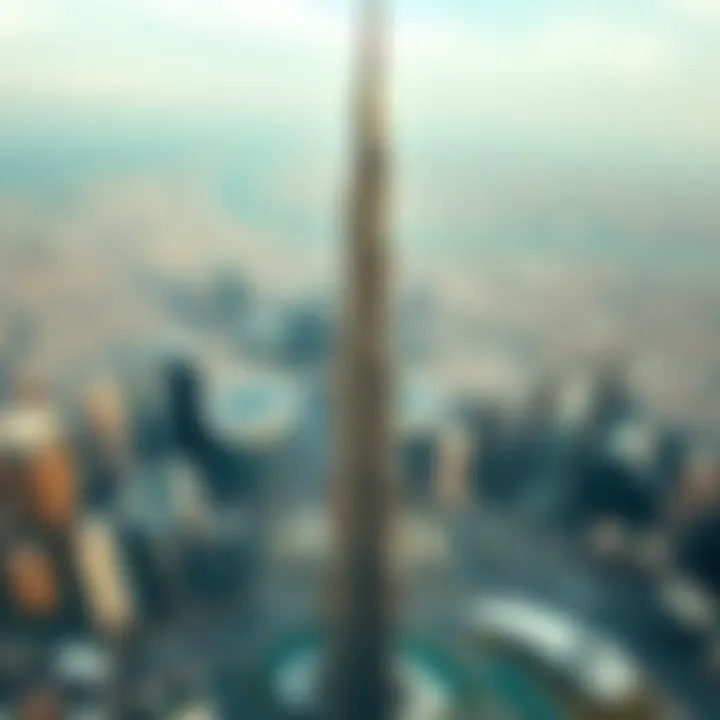
Typically bustling with energy, souks offer a plethora of goods – from spices that tingle your senses to textiles that tell stories of craftsmanship. Buying saffron or exotic spices, for instance, is much more than a simple purchase. It’s an invitation to engage with the local culture and perhaps even to learn a bit about the recipes that embody Emirati traditions.
When you visit places like the Gold Souk in Dubai, you’re not just buying jewelry; you're witnessing the artistry that goes into each piece. The glittering displays captivate one’s attention and provide insight into the fashion trends within the region. Furthermore, haggling for a price enhances the shopping experience, making it memorable.
It’s important to embrace the culture here; an understanding of specific etiquettes can be quite beneficial. For instance, when bargaining, persistence often pays off, and it's seen not just as customary but also respectful. A good rule of thumb is to start your negotiations at a third of the seller’s initial asking price.
These souks offer more than goods; they provide a sense of community, a way to connect with locals, and a peek into the everyday lives of Emiratis.
"The souks aren’t just markets; they’re the economic pulse of the region where history and commerce meet."
Modern Malls: Luxurious Retail Options
In stark contrast to the picturesque chaos of the souks, modern malls in the UAE present a polished, air-conditioned escape. The grandeur of malls like The Dubai Mall and Yas Mall in Abu Dhabi offers an experience rivaling that of many global shopping capitals.
These shopping complexes are not only designed for retail therapy; they are destinations in their own right, featuring world-class entertainment, gourmet dining, and cultural exhibitions.
- The Dubai Mall, for example, boasts over 1,200 retail stores, including high-end international brands and local designers. You can enjoy everything from luxury fashion to electronics. After a shopping spree, visitors can unwind at the Dubai Aquarium or take in a show at the massive indoor ice rink.
- Similarly, Yas Mall seamlessly integrates shopping with leisure activities. Families often find joy in the myriad of experiences available, from cinemas to celebrity chef restaurants that offer exquisite dining options.
The convenience of modern malls isn’t just in the variety; they also cater to comfort with amenities like valet services, Wi-Fi lounges, and kids’ play areas, making them family-friendly environments. Parking is ample, crowds are controlled, and shopping becomes a lavish affair.
For investors and real estate enthusiasts, the development of these malls indicates growing consumer trends and prospects for future investment in commercial properties. The synergy between shopping and entertainment continues to redefine the retail landscape in the UAE, making it a vital consideration for anyone looking to dive deeper into the market.
In summary, both traditional souks and modern malls are essential elements of the UAE's shopping experience. They reflect the rich cultural narratives and the luxurious lifestyle that the nation embodies. Understanding these aspects can help enhance one's connection to the locale, whether through investment or simple appreciation of the country’s complex identity.
Festivals and Events: Cultural Celebrations
Festivals and events in the UAE serve as vibrant expressions of the region's cultural heritage, community spirit, and diverse traditions. They offer a unique opportunity to experience the amalgamation of heritage and modernity, which lies at the heart of this federation. Engaging in such festivities is not just about watching shows or visiting markets; it’s about feeling the pulse of life in the UAE. From global shopping extravaganzas to deep-rooted cultural displays, these celebrations are a window into the soul of the nation.
The significance of festivals goes beyond mere entertainment; they provide numerous benefits for investors, homebuyers, realtors, and expats alike. Participating in local festivals can foster connections, strengthen community ties, and offer valuable insights into local customs and practices. This is especially relevant when navigating the real estate market or understanding lifestyle dynamics across the emirates.
Dubai Shopping Festival: A Shopping Extravaganza
The Dubai Shopping Festival stands out as a hallmark of extravagance on a global scale. It transforms the city into a bustling hub of commerce and entertainment, attracting tourists from near and far. Launched in 1996, the festival has grown to become a monumental event that showcases not only retail but also a convergence of different cultures.
- Key Highlights:
- Massive discounts on luxury brands and traditional items create an irresistible allure for shoppers.
- Extravagant parades and fireworks display add an exciting layer to the shopping experience.
- Various entertainment segments, including concerts and fashion shows, cater to all ages.
For investors, the Dubai Shopping Festival presents opportunities to tap into a booming tourism sector, while homebuyers and expats can leverage these events to network and explore the vibrant lifestyle offered in the city. The festival encapsulates the essence of Dubai as a shopping paradise, while also alluding to the robust economic landscape that supports it.
"The Dubai Shopping Festival is more than just a shopping spree; it’s a celebration of culture, a melting pot that attracts the world to the UAE."
Camel Racing: A Tradition in Motion
Camel racing, often regarded as the national sport of the UAE, maintains its esteemed place in the cultural fabric of the nation. It’s a spectacle that combines speed, strategy, and the magnificent bond between the camel and its trainer. Unlike any other sport, it pays homage to the Emirati heritage of falconry and animal husbandry.
During the racing season, which runs from October to April, numerous events take place across various tracks, notably in Al Wathba and Dubai. The races are typically held in the early mornings when the sun casts a warm glow, making for an exhilarating atmosphere.
- Important Aspects:
- Training Regimen:
Camel trainers invest significant time into preparing their camels, often using advanced technology like robotic jockeys to enhance performance. - Community Engagement:
These races are not merely about competition; they foster community involvement and serve as a gathering for families and friends. - Cultural Pride:
The sport instills a sense of local pride, as it showcases the historical significance of camels in Arabian culture.
Participating in camel racing events offers insights into the traditions that shape Emirati identity, allowing expats and visitors a chance to step into something uniquely local. Investment opportunities also arise as these events promote tourism and drive the economy by attracting spectators and enthusiasts alike.
Architectural Wonders: A Study in Design
Architectural wonders are not just structures; they’re narratives of innovation, cultural significance, and the relentless pursuit of excellence. In the context of the UAE, these buildings embody the aspirations of a nation that has rapidly transformed from a humble desert landscape into a global hub of commerce and tourism. The importance of discussing architectural achievements within the UAE lies in understanding how design transcends mere aesthetics to influence lifestyle, economy, and social interaction.
Innovative Skyscrapers: Defining the Skyline
The skyline of the UAE, particularly that of Dubai, is a sight to behold. Skyscrapers like the Burj Khalifa, the tallest building in the world, symbolize not only architectural skill but also ambition. These towering structures are involved in the economic fabric of the region, attracting investments and creating jobs.
Alongside their role as economic drivers, innovative skyscrapers such as the Burj Al Arab and One Za'abeel showcase state-of-the-art engineering and design principles. They offer breathtaking views from dizzying heights and serve as landmarks that tourists flock to capture in photos. What truly sets these buildings apart is their unique shapes and sustainable technologies that have become a hallmark of modern Emirati architecture.
Key Points:
- Engineering Feats: The construction techniques and materials allow for designs that were once considered impossible.
- Cultural Significance: Each skyscraper usually echoes elements of UAE's culture and heritage, contributing to a sense of identity through architectural expression.
As investors, homebuyers, or even future architects, recognizing the implications of these structures can influence decisions and strategies around real estate opportunities in the UAE.
Sustainable Architecture: Future Directions
With the UAE's commitment to sustainability, the growth of sustainable architecture has become a critical part of its landscape. The focus on energy-efficient buildings and sustainable design principles not just addresses environmental concerns but also appeals to a conscious consumer base that values eco-friendliness.
Buildings designed with sustainability in mind, such as the Masdar City, are pioneering efforts that combine modern living with respect for the environment. They utilize solar panels and utilize natural ventilation systems to reduce energy consumption. This doesn’t merely comply with regulations but sets a standard for future developments, establishing the UAE as a leader in sustainable urban planning.
"Sustainable architecture in the UAE reflects a shift in priorities, balancing luxury living with ecological responsibility."
Considerations for Investors and Architects:
- Understanding sustainable materials and methods can open new investment avenues.
- There is an increasing demand for homes that offer both comfort and sustainability due to rising awareness among residents and potential buyers.
By exploring these architectural wonders, one can see how the UAE is hell-bent on shaping an identity that harmonizes tradition with the future, providing not just visually stunning buildings, but also practical solutions to contemporary challenges.
For more in-depth studies on architecture, visit sites like Wikipedia or the Encyclopaedia Britannica.
As the UAE continues to grow, the architectural narrative will only become richer, offering an array of opportunities for those looking to invest, live, or contribute to this incredible landscape.
Culmination: Timeless Appeal of the UAE
The United Arab Emirates, a true melting pot of cultures and experiences, stands out not only for its rapid development but also for its deep-seated richness that runs through its history, architecture, and lifestyle. With each destination revealing a layer of uniqueness and depth, the UAE proves to be an exceptional travel destination in the modern world. In this concluding section, we wish to explore what makes the UAE appealing and relevant in today’s global scenario.
Reflections on Cultural Richness
When one thinks of the UAE, an image of cutting-edge skyscrapers and luxurious shopping malls may spring to mind, yet the country’s soul is deeply intertwined with its cultural heritage. From the majestic Sheikh Zayed Grand Mosque in Abu Dhabi to the vibrant art scene in Sharjah, cultural wealth is present everywhere. Each emirate contributes a chapter to the evolving narrative of the nation.
One cannot help but be captivated by how traditions are not merely preserved, but actively celebrated alongside modernity. Festivals like Eid and National Day showcase local art, music, and cuisine, allowing visitors to immerse themselves in Emirati traditions. Moreover, institutions like the Louvre Abu Dhabi and Sharjah Art Museum provide platforms for contemporary artists, seamlessly bridging the gap between today and yesterday.
"In the tapestry of the UAE’s culture, each thread tells a story, weaving the past into the fabric of the present."
This combination of heritage and innovation makes the UAE a living gallery of cultural richness. For those looking to invest or settle, this environment offers a unique blend of progressive ideologies while cherishing time-honored beliefs.
The Future of Travel in the UAE
Looking ahead, the future of travel in the UAE appears promising, infused with ambition and sustainability. With an eye on the upcoming Expo 2025 in Osaka, investments are already rolling in to enhance infrastructure, making accessibility seamless for visitors from all corners of the globe. New projects and attractions are set to redefine luxury and immersive experiences.
Sustainability is at the forefront of many initiatives, signaling a shift from sheer opulence to eco-conscious travel. The Dubai Sustainable City, for instance, sets a precedent for sustainable residential living and tourism, providing a blueprint for the rest of the region. Additionally, unique offerings such as eco-tours in the mangroves of Abu Dhabi reflect an increasing interest in environmentally respectful travels.
Moreover, with technological advancements like Augmented Reality and Virtual Reality, travelers can look forward to more enriching experiences as they explore. It's about experiencing places, not just visiting; transitioning from tourists to active participants is the direction travel is taking.
In summary, the UAE isn't just a destination but a thriving hub of opportunity, culture, and future-forward thinking. With myriad experiences waiting to unfold, both visitors and investors will find that this nation offers a timeless appeal, resonating with a wide array of interests.
As one embarks to explore this incredible landscape, it’s evident that the UAE continually evolves while remaining rooted in its rich history, making it a unique destination for all.



